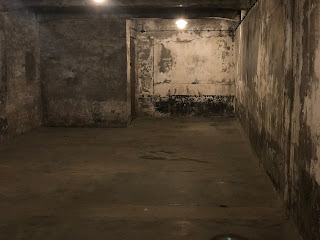 |
| Sign at the entrance of Auschwitz 1. It reads: "Work will make you free." |
While visiting Auschwitz, I could not help but recognize the parallels, as well as the extremely harsh contrast, between visiting the memorial museum today and being deported to the camp during World War II.
To get to the camp, we walked. We walked from the very comfortable and warm Center for Dialogue, where we are fed amazing food, in our heavy winter jackets and protective footwear. Similarly, the Jewish prisoners walked to the camp as well. They were unloaded on the shipment platform a short distance away and marched to Auschwitz One. Unlike us, the prisoners did not come from a comfortable center with warm beds and warm food. Many of the prisoners came from ghettos, where starvation was already plaguing their populations. Some who had arrived in the summertime were well overdressed. They had put on as many of their clothes as possible since most of the time they were only allowed to being that they could carry. Renee Firestone, a Hungarian survivor, wore a bathing suit her father had gotten her while on a trip. She held onto this bathing suit as a reminder of her past and childhood. She was devastated when SS officers made her remove it and give it up with the rest of her belongings (Last Days Film).
Once we got to the camp we were lead to a building where we went through security, picked up our headphones, and had our tickets scanned to give us access to the camp. The new prisoners also started in the same building. In this building they were stripped of their belongings, documented, shaved, assigned a number as their identity, and then forced into camp. Irene Zisblatt, for example, went to great lengths to hold onto four diamonds that her mother had given her. In order to hide them, she would swallow the diamonds, let them pass through her, and recollect them once they were passed. She repeated this many times throughout her time in Auschwitz (Last Days Film).
Once we were “processed,” we walked into the camp on our own free will. No one was forcing us, no one was threatening us, no one wanted to kill us. We walked in with our identity, with our dignity, and with our humanity. We had the right to exercise our free will all day. If we did not want to enter a building, we did not have to. If we wanted to sit for a minute we were allowed to. If we wanted to have a conversation with our neighbor, we were allowed to.
The prisoners had no free will. Before they even got to camp, their rights were taken away by the emerging German Empire. They were forced to leave their land and belongings, and once they arrived at the camp, they lost even more. They could not decide what to wear, what to eat, where to sleep, or what their job was. They were stripped completely of their right to make decisions. They were treated more poorly than cattle.
 |
| Crematorium 1 in Auschwitz 1. |












0 comments:
Post a Comment